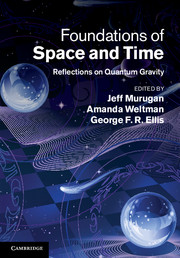Book contents
- Frontmatter
- Contents
- List of contributors
- 1 The problem with quantum gravity
- 2 A dialogue on the nature of gravity
- 3 Effective theories and modifications of gravity
- 4 The small-scale structure of spacetime
- 5 Ultraviolet divergences in supersymmetric theories
- 6 Cosmological quantum billiards
- 7 Progress in RNS string theory and pure spinors
- 8 Recent trends in superstring phenomenology
- 9 Emergent spacetime
- 10 Loop quantum gravity
- 11 Loop quantum gravity and cosmology
- 12 The microscopic dynamics of quantum space as a group field theory
- 13 Causal dynamical triangulations and the quest for quantum gravity
- 14 Proper time is stochastic time in 2D quantum gravity
- 15 Logic is to the quantum as geometry is to gravity
- 16 Causal sets: discreteness without symmetry breaking
- 17 The Big Bang, quantum gravity and black-hole information loss
- 18 Conversations in string theory
- Index
- References
16 - Causal sets: discreteness without symmetry breaking
Published online by Cambridge University Press: 05 August 2012
- Frontmatter
- Contents
- List of contributors
- 1 The problem with quantum gravity
- 2 A dialogue on the nature of gravity
- 3 Effective theories and modifications of gravity
- 4 The small-scale structure of spacetime
- 5 Ultraviolet divergences in supersymmetric theories
- 6 Cosmological quantum billiards
- 7 Progress in RNS string theory and pure spinors
- 8 Recent trends in superstring phenomenology
- 9 Emergent spacetime
- 10 Loop quantum gravity
- 11 Loop quantum gravity and cosmology
- 12 The microscopic dynamics of quantum space as a group field theory
- 13 Causal dynamical triangulations and the quest for quantum gravity
- 14 Proper time is stochastic time in 2D quantum gravity
- 15 Logic is to the quantum as geometry is to gravity
- 16 Causal sets: discreteness without symmetry breaking
- 17 The Big Bang, quantum gravity and black-hole information loss
- 18 Conversations in string theory
- Index
- References
Summary
Causal sets are a discretisation of spacetime that allow the symmetries of GR to be preserved in the continuum approximation. One proposed application of causal sets is to use them as the histories in a quantum sum-over-histories, i.e. to construct a quantum theory of spacetime. It is expected by many that quantum gravity will introduce some kind of ‘fuzziness’, uncertainty and perhaps discreteness into spacetime, and generic effects of this fuzziness are currently being sought. Applied as a model of discrete spacetime, causal sets can be used to construct simple phenomenological models which allow us to understand some of the consequences of this general expectation.
Introduction: seeing atoms with the naked eye
At present, one of the most important tasks in theoretical physics is to understand the nature of spacetime at the Planck scale. Various indications from our current most successful theories point to this scale: quantum effects are to be expected to invalidate the general theory of relativity here. What should replace our current best understanding of spacetime? This question remains controversial as no theory of quantum gravity can yet be claimed to be complete. For example, some researchers are convinced that the kinematical structure used to replace the continuous manifolds of GR should be discrete, but others do not adhere to this requirement. George Ellis' great contribution to our understanding of spacetime, and his interest in the issue of spacetime discreteness, make this a very appropriate topic for these proceedings.
Information
- Type
- Chapter
- Information
- Foundations of Space and TimeReflections on Quantum Gravity, pp. 385 - 409Publisher: Cambridge University PressPrint publication year: 2012
References
Accessibility standard: Unknown
Why this information is here
This section outlines the accessibility features of this content - including support for screen readers, full keyboard navigation and high-contrast display options. This may not be relevant for you.Accessibility Information
- 2
- Cited by
